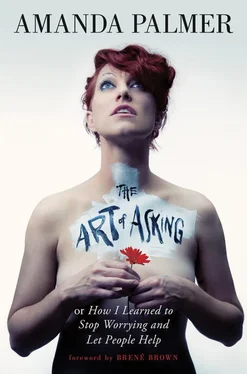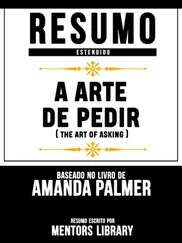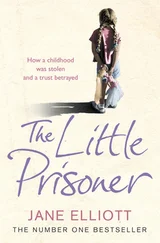• • •
It is an interesting thing, a white-painted face. It’s a historically rich signifier, the onion layer of clown-white cream covering the skin like a paper-thin mask, a universal invitation from one human being to another that says:
Staring at my face and making eye contact is acceptable and encouraged .
Only now do I realize why it made so much sense to keep the white face paint as I transitioned from being a statue to being in a rock band. Our Weimar-cabaret-inspired makeup was a signature of The Dresden Dolls. Often mocked (especially by the other plaid-clad indie Boston bands who referred to us as “the gay mime band”), often misunderstood (by the journalists who asked what our alter egos, à la Ziggy Stardust or Alice Cooper, were supposed to “represent”), and often seen reproduced on the faces of our hardcore fans as a symbol of solidarity, the white face paint functioned as a freak flag.
I liked giving permission to people to look at my face. Not so much because I wanted them to LOOK AT ME LOOK AT ME LOOK AT ME, but because I wanted them to feel invited to meet my gaze and share a moment. And I knew the game worked. I knew that, having invited them into my face like a host invites a guest into a kitchen, I would be equally invited to look back into theirs. Then we could see each other. And in that place lies the magic.
I see you .
BELIEVE ME.
Ask any great actor: sometimes the mask is the tool that lets you get at the truth.
• • •
There is something about silence.
One night in a candlelit restaurant in San Francisco, shortly after we got married, I asked Neil if we could just write each other notes during the whole meal. In real time, like texting, but with pens and paper.
The waiter thought we were slightly strange, but by the end of the meal we’d shared a degree of intimate information that we probably wouldn’t have if we’d just been sitting there chatting. And we could illustrate our points with pie charts and cartoons. And we really enjoyed our food, because we weren’t literally talking through it.
The couple next to us asked what we were doing, and when we told them, they ordered a pad of paper and two pens from the waiter.
• • •
One of the things I loved best about The Bride was how, though she was silent, she could make it possible for people to talk to one another.
I was a ready-made conversation piece. And nothing delighted me more than to see people with nothing in common chatting about The Bride the way they’d chat about an ambulance pulling up, or a flash thunderstorm.
Excuse me, is that a person?
Dude, is that a real person?
Wow, is that a real statue?
Oh, look! What does he do when you give him money?
There are ingredients that create safe space for communion. It would make me absolutely beam with joy when I saw strangers giving each other money, saying:
Wait, hey! Take this dollar, put it in her hat! You gotta see this! That’s a real person!
It gave me faith in humanity. Even if they thought I was in drag.
• • •
Anthony was my best friend.
I’ve been trying, since I was a kid, to explain to people exactly WHAT he was to me when I was growing up. He wasn’t quite my guru, wasn’t quite my parent, wasn’t quite my teacher.
I usually attempted to describe him by mumbling something that included the word “mentor,” but I mostly found myself satisfied with this run-on portrait: Anthony met me when I was nine and taught me everything I know about love and knows me better than anybody and we still talk almost every single day even if I’m touring in Japan .
He loved telling the story of one of our first interactions, soon after he moved in next door to my parents’ house on the quiet road where I grew up in Lexington, Massachusetts.
It was a winter night, after a big snowfall in our little suburban neighborhood, and he and his wife, Laura, were throwing a dinner party. I ambled across my lawn over to his and started pelting their window with snowballs. I thought it was funny. He did, too, sort of.
He came to the door.
I want a snowball fight , I said.
I can’t , he said. But I’ll get you back later .
And he returned to the dinner party, back into the warmth and fire and wine of the adult world behind him.
Then, according to the story, I returned about twenty minutes later, and started pelting their giant picture window with snowballs a second time.
He came to the door again.
What the hell?
You said you’d get me later , I said. I’m here to get gotten .
Amanda, it’s been twenty minutes , he said. I meant later… like… tomorrow .
I don’t actually remember this happening, but I know the story by heart, because he’s told it so many times. I also don’t remember the first time I hugged him, but he tells that story, too.
I was thirteen, and our relationship had evolved from occasional next-door-neighbor snowball enemies to full-on pals. He claims we were standing in his driveway and something had happened that merited An Actual Hug.
But we had never hugged, and I was, according to him, interested in the idea, but wasn’t used to hugging. So I leaned my body against his, he says, like a slowly falling pine tree, letting my head rest on his chest while the rest of my body kept a terrified distance.
Anthony and Laura didn’t have children, and I was gradually spiritually adopted. Anthony was a professional therapist, and a good listener. I desperately needed someone to listen. And once I’d unloaded all my teenage pain on him, he knew the way to win my trust. He never told me what to do.
Instead, he told me stories.
Stories about his life, stories about Zen masters, stories about his grandfather.
Here’s one of my favorites.
A farmer is sitting on his porch in a chair, hanging out.
A friend walks up to the porch to say hello, and hears an awful yelping, squealing sound coming from inside the house.
“What’s that terrifyin’ sound?” asks the friend.
“It’s my dog,” said the farmer. “He’s sittin’ on a nail.”
“Why doesn’t he just sit up and get off it?” asks the friend.
The farmer deliberates on this and replies:
“Doesn’t hurt enough yet.”
Through the years, Anthony would tell me this one whenever I was suffering from particularly bad bouts of self-destructiveness. Those were pre-cell-phone days, and I used to call him from the dorm, from my squalid sublets, from boyfriends’ apartments, and collect from pay phones all over Europe the year I backpacked and studied abroad. I’d leave messages that filled his answering machine and mail him typewritten letters that were too long to stuff into an envelope without bursting the seams.
WHY DO I KEEP DOING THESE THINGS TO MYSELF? I’d ask him, moaning about my latest killer hangover, brush with death, lost wallet, or on-again-off-again relationship with the latest drug-abusing (but really good-looking) boyfriend.
I could hear him smiling through the phone.
Ah, beauty. Doesn’t hurt enough yet .
• • •
I’ve had a problem feeling real all my life.
I didn’t know until recently how absolutely universal that feeling is. For a long time, I thought I was alone. Psychologists have a term for it: imposter syndrome. But before I knew that phrase existed, I coined my own: The Fraud Police.
The Fraud Police are the imaginary, terrifying force of “real” grown-ups who you believe—at some subconscious level—are going to come knocking on your door in the middle of the night, saying:
Читать дальше












